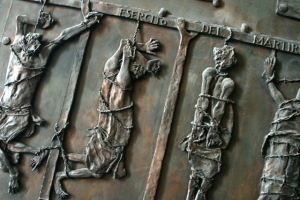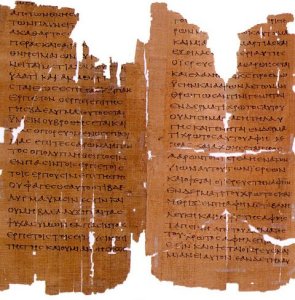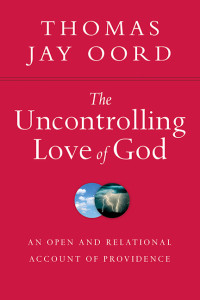God Can’t – Making Sense of Things
I’m on a quest to make some sense of God and life.
The journey isn’t easy. I seek help from the sciences, arts, literature, cultures, sages and saints, and wisdom traditions. I also read theological texts and devote time to thinking about God. But I see as if looking through a darkened glass.
Certainty and Mystery
I’ve noticed two trends among theologians. Both trends include theologians who, unlike me, are not on a quest to make some sense of God and life.
The first group of theologians believes they already have the right answers. They’re certain their view of God is correct. They typically claim this assurance by appealing to an inerrant sacred text or particular tradition. They are not on a quest of discovery, because they have God and life figured out.
Other theologians have given up the quest to make sense of God and life. Many of them have abandoned the quest in reaction to those who think they’ve got God and life already figured out. These theologian rightly see the problems that come with certainty. They respond by appealing to mystery and give up on constructive theology.
In my quest to make some sense of God and life, I’m steering a middle way between certainty and mystery. On this adventure, humility is paramount. I haven’t got God and life figured out. But I also seek constructive proposals that seem to come closer to truth than alternatives.
My quest has prompted me to believe some of our fundamental beliefs about God need changing. I don’t know this with certainty, of course. But I can make better sense of God and life if some long-standing theological beliefs are replaced by better ones.
In the following, I ask you to consider the possibility that God can’t do some things. In fact, I’m going to argue that God can’t control creation. Thinking about God’s power in this new way has helped me make better sense of God and life.
Speculating about God’s Nature
The theologians who appeal to mystery are wary of any talk about God’s nature. They sometimes claim we can only talk about God’s actions. Of course, knowing what counts as an act of God requires some prior belief about who God is and how God acts. This belief comes from some implicit or explicit assumption about God’s nature.
I think we should humbly propose claims about what God’s nature may be like. My primary argument for why we are justified in speculating about God’s nature comes from the Bible. Biblical authors OFTEN make statements about God’s nature or attributes. They don’t just describe God’s actions. Here are a few:
“God is love” (I Jn 4:16). “God is spirit…” (Jn. 4:24). “The Lord our God is holy” (Ps. 99:9). “The Lord is one” (Deut. 6:4). “God … knows everything” (1 Jn. 3:20). “God is just” (2 Thess. 1:6). “God is not unjust” (Heb. 6:10). In God’s nature “there is no change or shadow of alteration” (James 1:17). “God is not a God of disorder but of peace” (1 Cor. 14:33).
I could list so many more.
Jesus Reveals God
I join with most Christians who think Jesus Christ reveals important information about God’s nature. Of course, we have to make judgments about what aspects of Jesus pertain solely to his humanness and which reveal something about God.
For instance, Jesus was located in one place. But like most Christians, I think God is omnipresent. Jesus seemed not to be omniscient. But like most Christians, I think God knows everything that can be known.
The passage of scripture many theologians today look to for how Jesus reveals God’s nature is Paul’s letter to believers in Philippi. In this text, Paul says that Jesus’ kenosis tells us something about God. Here’s the pertinent passage:
“Let each of you look not to your own interests, but to the interests of others. Let the same mind be in you that was in Christ Jesus, who, though he was in the form of God, did not regard equality with God as something to be exploited, but emptied himself (kenosis), taking the form of a slave, being born in human likeness. And being found in human form, he humbled himself and became obedient to the point of death — even death on a cross (Phil. 2:3-8).
All Scripture requires interpretation. Theologians interpret this passage in various ways and apply it to various issues.
A number of theologians are comfortable saying this kenosis passage tells us that God voluntarily chooses not to act in certain ways. God voluntarily self-limits, creates space for creation, and gives creatures freedom, say theologians as influential as Jürgen Moltmann and John Polkinghorne. This limitation is based on God’s free decision.
God Can’t vs. God Won’t
The typical interpretation of Jesus’ kenosis says that God voluntarily self-limits and therefore won’t control creatures (at least most of the time). I’ve come to think it’s better to believe God can’t control creatures, ever.
The distinction between “God can’t” and “God won’t” is important for accounting for God’s action or inaction to prevent genuine evil. If God won’t prevent evil even though God could, we’re left with the usual questions about evil. We’ll wonder why a God who voluntarily self-limits doesn’t become un-self-limited, in the name of love, to prevent genuine evil.
But if God can’t prevent evil, a completely new way of thinking emerges. In my quest to make some sense of God and life, I think we should say God can’t prevent evil by acting alone.
Scripture says God Can’t
Some people think saying God can’t do some things is blasphemous. They belief God can do anything, and they (wrongly) think the Bible clearly says so.
A few biblical passages do say God can do anything. The best known is probably “with God all things are possible” (Mt. 19:26 and elsewhere). In this passage (and the other gospels reporting the same conversation), Jesus seems to be saying that offering salvation is always possible for God. That would be different that saying literally nothing is impossible for God to do.
There are passages in the Bible that specifically say God can’t do some things. They aren’t saying God voluntarily chooses not to do some things. They say God simply cannot do them. Here are a few:
“It is impossible for God to lie” (Heb. 6:18). See also Titus 1:2.
“God cannot be tempted by evil” (Js. 1:12).
“If we are faithless, [God] remains faithful — for he cannot deny himself” (2 Tim. 2:13).
The statement, in my view, covers the others. When Paul says God “cannot deny himself,” he seems to be saying that God’s own nature places limits on what God can do. God must be God, and God cannot be otherwise.
Christians like me who privilege the Bible on theological matters can’t ignore statements that seem to tell us something about God’s nature and inherent limitations.
A Limited God is Worthy of Worship
If we think about it, limitations based on God’s nature aren’t that big a deal. They shouldn’t shock us, even if we haven’t yet thought much about it.
Does it diminish our view of God, for instance, to admit that God can’t lie? I doubt it. And I doubt our view of God is diminished if we consider the alternatives to other divine attributes.
For instance, I doubt many of us worry God can’t voluntarily decide to be 671 instead of triune. Most Christians assume that trinity is part of what it means to be God. I’ve never heard anyone say, “A triune God is unworthy of my worship. But I could worship a God who is 671!”
We probably don’t think it’s a significant limitation that God must be omnipresent. We probably don’t think it’s a shame God must be righteous instead of sinful.
Upon reflection, the fact that God can’t do or be some things doesn’t seem so bad after all. In fact, we may come to think a God worthy of our worship must be limited in some ways if our worship is to make any sense. That’s how I see it, at least.
God must love: God cannot not love
One of the most important biblical statements about God’s nature is that God’s eternal and unchanging nature includes steadfast love. God always loves. God cannot not love, to use the double negative.
If God’s nature is love of a certain type, this can help us solve the problem of evil. It might helps us make sense of God and life. Here’s what I mean:
Perhaps God’s love is necessarily self-giving, other-empowering, and therefore uncontrolling. Perhaps because God’s nature is love, God can’t control others. To put it positively, God’s love always involves giving freedom and/or agency to creatures. Because God’s nature is love, God cannot do otherwise.
Drawing from the kenosis passage we looked at earlier, I’ve come to call this idea “essential kenosis.” My view says God necessarily gives freedom, agency, self-organization, existence, and law-like regularities to creatures. Consequently, God cannot fail to provide, override, or withdraw this gift. Theses moment-by-moment gifts are, to use Paul’s word, “irrevocable” (Rm. 11:29).
The Powerful God of Uncontrolling Love
If you’ve followed my arguments this far, your mind is probably whirling!
You’re wondering, “If essential kenosis is true, how do I understand God’s creating, miracles, resurrection, eschatology, etc.?”
I’ve asked these questions myself and proposed some answers in various publications, including my recent book, The Uncontrolling Love of God. I won’t rehearse them here.
Looking at God’s power through the lens of God’s love and not total control will be a new to some people. But I know of nothing in the Bible to suggest that thinking this way does injustice to the overall biblical witness. After all, most folk think God always acts lovingly – even when biblical writers report God being angry with sinners.
I don’t have it all figured out. I see through a glass darkly. And I admit there are a few biblical passages that aren’t easily explained by the idea that God always acts loving. They are the exceptions to the overall drift of scripture.
But I do think essential kenosis is a biblically supported view of God’s nature. And I know it has already helped many people make sense of why God doesn’t prevent genuine evil.
Essential kenosis builds upon the biblical claims about God’s inability to do some things, because God “cannot deny himself” (2 Tim. 2:13).

Comments
I think it would deepen our understanding of God even more to think about how God responds to evil in the world. Sometimes some have said if we have a God who can’t then we must have a God who is simply powerless or perhaps even indifferent to Hos creation. I think if we would think about how God responds to evil amongst His creation we would understand more fully how God truly loves us. Perhaps you could expand on this with your own thoughts on how God responds to evil amongst His creation.
Thanks, Todd. I do think God responds to evil. And I think God call us to join the project of overcoming evil. I address this some in The Uncontrolling Love of God. But I agree that it deserves more of my attention and explanation.
I found this specific item very helpful to clarify the controlling topic….
…“essential kenosis.” …God necessarily gives freedom, agency, self-organization, existence, and law-like regularities to creatures. Consequently, God cannot fail to provide, override, or withdraw this gift. Theses …gifts are… “irrevocable” (Rm. 11:29).
I’m happy to hear this, Scott!